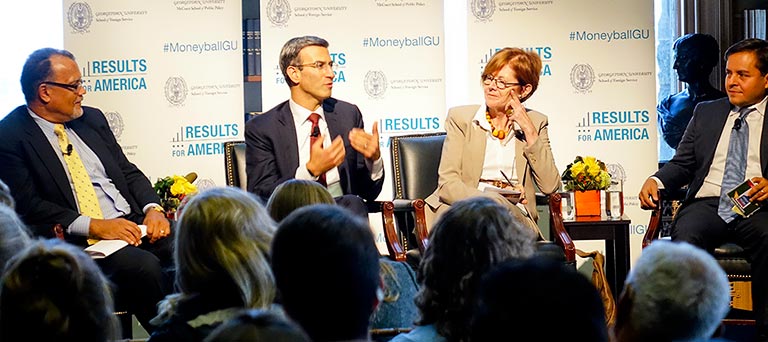Former OMB Director Orszag, Panelists Explore Moneyball for Government
Relying on data and evidence in policymaking is critical but challenging said Peter Orszag, the former director of the Office of Management and Budget at a McCourt School event on Monday, October 5, 2015.

The event, How Can Moneyball for Government Transform U.S. Domestic Policy and U.S. Foreign Assistance was hosted by McCourt and Results for America to discuss the national best-selling book Moneyball for Government, and a new chapter “Foreign Assistance and the Revolution of Rigor.” The event was held in conjunction with the Walsh School of Foreign Service .
Osrzag, currently vice chairman of corporate and investment banking at Citigroup and contributor to Moneyball for Government, made the comments on a panel examining how Moneyball strategies can improve the effectiveness of U.S. domestic policy.
The panel was moderated by McCourt School Dean Edward Montgomery and featured McCourt School professor Jane Hannaway, a leading expert in evaluating what works in our schools, and David Medina,co-founder of Results for America.
The panel agreed that federal, state, and local governments must take advantage of the increased availability of data and declining costs of processing it.
“There is growing momentum within government to figure out what works,” said Medina. “Let’s valueevidence upfront and see where the data leads us.”
The second panel featured the former administrator of the U.S. Agency for International Development and current distinguished fellow with the School of Foreign Service Rajiv Shah; Washington Post columnist and former Assistant to President George W. Bush for Policy & Strategic Planning Michae Gerson; and Sally Paxton, the U.S. Representative of Publish What You Fund, a group devoted to more transparency in foreign aid. Shah and Gerson authored the new book chapter, which will be available in November.
In a conversation moderated by Joel Hellman, the new dean of the Walsh School of Foreign Service, the panel examined how the use of data and evidence can lead to more successful foreign aid.
“Effective foreign aid is timely, comprehensive, structured and accessible,” said Sally Paxton. “We need structured and accessible data to meet our sustainable development goals.
In November, 2014, Results for America published Moneyball for Government , the best-selling book authored by a bipartisan group of nationally-recognized experts to help ensure that budget, policy, and management decisions by governments at all levels are informed by the best possible data and evidence about what works.